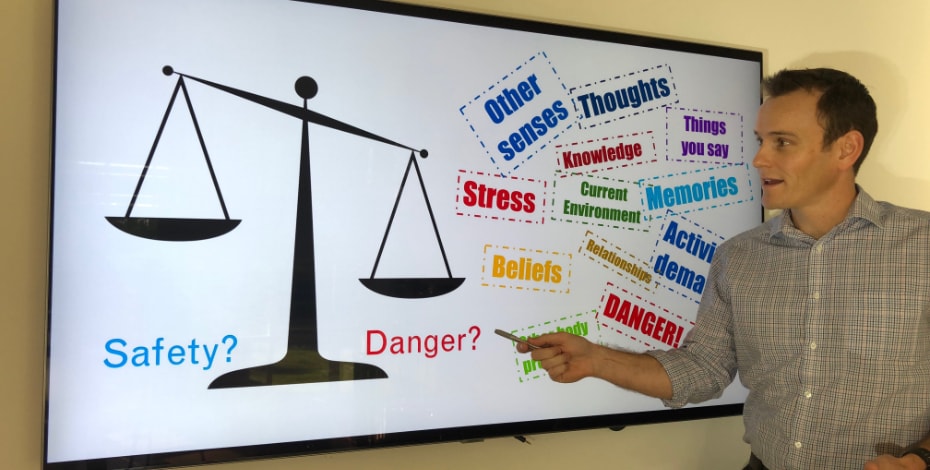
Bespoke course empowering patients with persistent pain

Physiotherapists at a Victorian clinic believe knowledge is power, and through an innovative program they are ensuring their patients become as powerful as possible.
‘Recover’ is a five-week course on offer at Beleura Health Solutions that is designed to give patients who suffer from persistent pain a deeper understanding of why and what they are experiencing, and the information to help them identify and implement strategies and actions to better manage their condition.
APA member Lachlan Wakeling developed the program after identifying a gap in services for patients developing persistent pain who might otherwise fail usual care and be referred to more intensive pain services much later in their journey.
‘It’s called Recover deliberately, as it’s designed to help people get on track to get better rather than be a pain management course. Overall, it gives the patient some knowledge and understanding about how to take control over their pain and take a leading role in their own recovery.’
Since starting in September last year, more than 30 patients have attended, with the course open to physiotherapists and patients from other clinics. Patient ages span five decades, starting with the late 20s. Data gathering includes standardised outcome surveys, with a focus on self-efficacy. Individual patient surveys are conducted in three stages: at the start of the course, at five weeks and three months post-course.
Lachlan says taking an open and collaborative approach can only provide more beneficial outcomes for both the clinician and patient. ‘In talking to a client base about pain, a clinician needs to be knowledgeable of the topic, comfortable in teaching it well and have enough of a focus on it to dive into it, but sometimes there is a big hole where it doesn’t get done until it’s too late. We identified a gap where we can intervene much sooner and present to some of those people who might otherwise end up at the more intensive pain services so much farther down the track.’
In developing the course, Lachlan has drawn on the experience and knowledge shared by clinicians David Butler and Lorimer Moseley in their book Explain Pain Supercharged. When enrolled in Recover, patients are expected to commit to all five 75-minute sessions and attend on consecutive weeks. Sessions give a nod to Butler and Moseley’s advice with a mix of group discussion, interactive activities, educational videos and resources for home. Topics include why things hurt, how pain works, understanding scans and pain medication, effective rehabilitation planning, returning to meaningful activity, the role of mental health in pain, relaxation strategies and the development of a personalised plan.
‘Quite simply, the ultimate aim is to reduce patient pain and improve their function and give them a greater sense of control over where they are going.’
LACHLAN WAKELING
‘In delivering the information we acknowledge that people have different ways of learning and taking on information, so we look at ways we can deliver this, such as keeping text minimal in slides, using videos, analogies and even tactile elements, such as the balance scale that we designed and use to draw out feedback from patients,’ Lachlan says. ‘We have a balance of delivering information that is scientifically accurate in a format that is easy to understand.’
Taking a client-centred focus in providing additional support or services to patients is particularly important for physiotherapists in private practice, he says.
‘It’s about listening to and reviewing your patient list—is there a way we can give them more support and advice in a service that they will want to engage with? It’s not a one-size-fits-all activity. What you develop has to have elements that are person-specific, and enable a patient to take ownership over their journey.’
However, he adds the course is not a cure-all for all patients and is most appropriate for those already with a degree of motivation to gain more control over their recovery.
‘Quite simply, the ultimate aim is to reduce patient pain and improve their function and give them a greater sense of control over where they are going. Going about this in a way that is interesting and engaging, and also actionable.
‘At least in my experience, our course, in a private clinic, running parallel with ongoing treatment is unique. It’s something we are seeing having benefit for our patients. It would be great to see similar interventions become more mainstream over time in primary contact healthcare.’
Choice advice on patient courses
Developing a course for patients starts with taking a client- centred focus, says Lachlan Wakeling. Apart from being willing to listen and share ideas with peers to maximise patient outcomes, he says:
- education should be linked to key beliefs, behaviours and a plan of action specific to each patient
- find different ways of teaching important information. You will already be good at explaining in a way that you learn, but this won’t suit everyone
- have a list of metaphors, stories, videos, images and resources to help
- time can be a barrier to covering all the important aspects well, and patients are often not compliant with home learning. Running a course like Recover creates a clear pathway for patients who need more help
- facilitated group discussion can be a powerful learning environment.
© Copyright 2025 by Australian Physiotherapy Association. All rights reserved.





